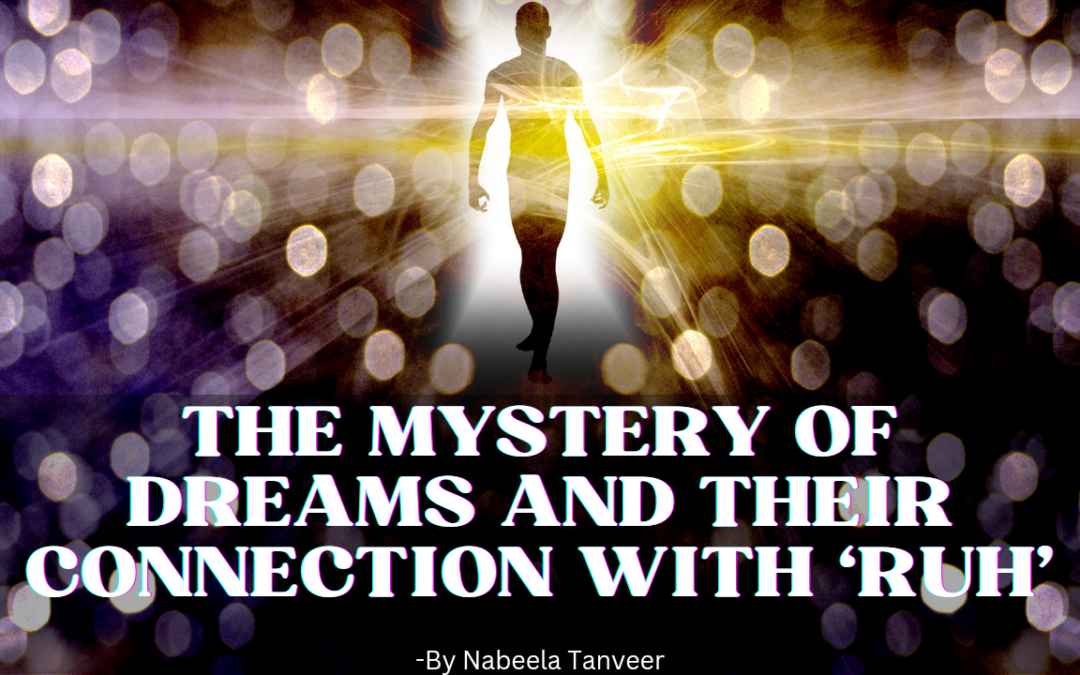REALITY OF DREAMS
We all experience dreams, some being queer and others being strange. After one, we are curious to find out an interpretation (tabeer) of whatever symbolism we came across during deep sleep. Mostly we are not able to comprehend the meaning. Only occasionally is the meaning of a dream literal, otherwise most dreams have a deeper meaning that we are not aware of consciously.
Quran uses the word ‘Taaweel’ for the interpretation of dreams. In Surah Yusuf, the king of Egypt approaches the courtiers and knowledgeable people, asking them to interpret his dream. All of them replied, “(These are) confused dreams, and we know not the Taaweel (interpretation) of such dreams.”
Interestingly, the Quran also uses the word ‘Taaweel’ for Mutashabihat Ayats in Surah Al-Imran, “And none knows its ‘Taaweel’ (interpretation) save Allah, and those firmly rooted in knowledge…” Quran (3:07). Here also we observe that the meaning of these Ayats is hidden, and everyone cannot achieve a deep understanding of them. This insight sheds light on the fact that Mustashabhihat Ayats share similarities with dreams.
The Quran clarifies and indicates that dreams have some meaning. Hence the question may arise that what exactly is a dream? According to Psychology, whatever we do, see, or witness gets stored in our subconscious mind. Everything from memories relating to childhood to adolescence are encoded in our minds. When we sleep, some parts of these unconscious memories become accessible to us in the form of a dream. One prominent professor of psychiatry at Harvard Medical School, even stated that “Dreams are a clear indication that the sleeping brain is working on memories at multiple levels…”. While experts are correct in linking the subconscious mind to this phenomenon, there is more to it. Many things get stored in our minds that we do not directly experience in this world, while the subconscious mind is elsewhere during sleep. Nothing material leaves the body during this time.
Surprisingly the Quran described the subconscious mind 1500 years back as it explained that there are three entities; Body, Ruh, and Nafs. However, people generally have the misconception that Ruh and Nafs refer to the same thing. Surah Anaam highlights that “And He it is who gives you ‘Wafaat’ (withdraws your selves) at night…” (6:60)
One may wonder why the Quran says that Allah gives you ‘Wafaat’ every night when it is commonly perceived to mean ‘death’. We can derive that this term ‘Wafaat’ means something else. Similarly, Surah Zamar clarifies that “Allah withdraws ‘Anfus’ at the time of their death, and those (Anfus, the selves) that die not, during their sleep…”.
According to the Quran, there are two ‘Wafaats’, one which occurs at the time of death and the other, which occurs every night when one sleeps. Contrary to peoples’ belief, not only the bad but also the good qualities and feelings are related to the Nafs or the ‘Nafs-e-Mutmainna.’. Psychology in itself is the knowledge of the Nafs (Ilm-e-Nafsiyat), but it does not acknowledge the information about the Nafs mentioned in the Quran. Ruh has nothing to do with good or evil deeds and thoughts as the Ruh is just a prerequisite or activator of life.
Just like a mobile phone can’t operate without a Sim; similarly, a human can’t be alive without a Ruh. Even though the sim has a complete record of everything that you do on the phone, it is not responsible for how it used. Once a body is given a Ruh, it receives life; however, it is the Nafs which is responsible for good or bad deeds. That is why the Quran mentions that every Nafs will be given its reward.
Quran also says that every Nafs will experience death. Surah Al-Imran states that-
“Every Nafs (the self) will taste of death” (3:185).
The literal meaning of ‘Wafaat’ is “to withdraw”. ‘Wafaat’ is something from which a return is possible, while one cannot come back after death (Maut). It is interesting to note is that the Quran uses the word ‘Wafaat’ for Hazrat Isa (A.S) instead of ‘Maut’. In other words, Hazrat Isa (AS) may come back.
Nafs resides in the subconscious mind, and it is this very Nafs which is withdrawn during sleep. Meanwhile, the Ruh remains within the body because if it is absent, the person would be dead. While a person is asleep, the entire body is working correctly, even though the Nafs or the subconscious mind is elsewhere. In other words, we lose consciousness of our self during the night. Since we can’t experience material things with our material existence, we can’t consciously experience things that happen in the place where the Nafs is withdrawn to. Dreams do have deeper meanings, which is why an interpretation of them may be beneficial.
The subconscious mind is a powerful tool that impacts our internal programming. When a person receives repetitive exposure to a lie, the brain may perceive it to be the truth. Even when we are asleep, our mind is receptive to whatever it senses. Researchers have concluded that the brain continues to listen or process words during sleep. In other words, exposure to certain words in sleep can possibly influence the behavior, attitudes, and actions of a person.
If a lecture is recorded and played to students while they are asleep, it will benefit their learning a lot. Our brain remembers what we hear during our sleep, even though we are not consciously aware of this reality. Another application of this concept involves modifying the behavior of an individual. A parent can use this to influence the habits of their children. If a child is asleep and they are exposed to a lecture telling them not to practice bad habits, it will affect them. Eventually, their mind will accept whatever is heard, and they will adjust their behavior.
THE STATUS OF ALLAMA IQBAL (R.A)
Even before achieving Prophethood, the Prophet (S.A.W) saw true dreams. The Prophet (S.A.W) also said that whoever sees me in his dream has truly seen me Satan cannot manifest himself in my name and attire.
Allama Syed Abdullah Tariq discusses a fascinating incident. A book named, “Seeratun Nabi Baadaz Wafaatun Nabi” is published in Pakistan. This book has a collection of dreams in which people saw the Prophet (S.A.W). The writer took pains to meet the dreamers and investigate for its authenticity personally. One dreamer in this book describes how he saw that people are waiting along with the Prophet (S.A.W) to begin Salat in his dream. The Prophet (S.A.W) is eagerly waiting for someone, and once he even asks everyone, “Hasn’t Iqbal come yet?”. Then the dreamer sees that a person with a mustache who is wearing a big sheet arrives. The Prophet (S.A.W) makes him stand beside him, just like Abu Bakr (R.A) was made to stand at his side once in a similar setting. The dreamer was not aware of the identity of Iqbal at that time. Later he came across a photo of Iqbal in the newspaper, which he immediately recognized. After searching for the whereabouts of Iqbal, this dreamer visited Sialkot to narrate the dream to him. After hearing the narration, Iqbal (R.A) started crying. Undoubtedly, Iqbal was a true Wali or friend of Allah.
Iqbal’s poetry is an explanation of the Quran. One can’t comprehend it instantly as it has deeper meanings layered within it. He loved Allah, the noble Quran, and the Prophet (S.A.W) dearly. He is often said to be the one who thought of the foundation of Pakistan, but contradicting this, in Iqbal’s own words in the Allahabad Address, indicate otherwise. He was not interested in the ‘Tehreek of Pakistan’, Instead, he wanted a Muslim Majority State within the Indian Federation. A state where Muslims can practice Islam in the way it is, and Islamic laws can be applied (to show people and the world the real face of Islam).
Even Iqbal’s son confirmed in many of his writings that Iqbal (R.A) had the least interest in the making of a separate Muslim country called Pakistan.
Due to Partition, there have been many short-term and long-term losses for humanity. While Muslims of that era may have thought that the creation of Pakistan was beneficial for their empowerment, this is not true. S. A. Tariq personally met religious scholars to discuss this idea in depth. Once, he even met Dr. Israr Ahmed to discuss the consequences of Partition. Unbeknownst to the Muslim community, Partition caused a big rift and weakened them. If that event had not occurred, India (or the combination of Pakistan, present-day India and Bangladesh) would have had a clear Muslim majority today. With a majority, they would have been the ones in power, which indicates that Partition did not genuinely benefit the Muslim community in the long-term. The creation of Pakistan did not help Muslims, as it is commonly believed. Syed Abdullah Tariq also discussed this idea with Irfan ul Haque Sahib who is a great peer, having millions of followers in Pakistan. Both Dr. Israr and Irfan ul Haque were very surprised to see things in this way. They even expressed regret and emphasized how they never thought about Partition in this way. Deen eliminates boundaries and spreads organically instead of creating divisions and breaking up people.
This creation of Pakistan is against the real essence of ‘Deen’. This event was a significant loss, and Allama Iqbal (R.A.) was not the founder of this thought process. Iqbal said everything in the light of the Quran while Jinnah didn’t know the Quran (he was also unable to read it).
No doubt, Muhammad Ali Jinnah was a real genius, but he failed us in matters of Deen by making Pakistan, which is against the spirit of Islam.
HOME-COMING !
Now the masses, especially the Muslims of India and, most importantly, the Muslims of Bangladesh and Pakistan, have to rethink their notions about Partition. They must realize that it was a great historical mistake. Is there any scope of turning back to what was? Would the people ever let a reunification happen? Would they spare the ones wanting to fix this error? Hasn’t the time come for the leaders to disclose the truth to their people?
Nevertheless, history has its mistakes that harm people. Those who cannot learn from their mistakes are bound to repeat them. Partition was and is still a loss for all the people of the subcontinent.
Quran asked us to be inclusive and wanted us to spread our reach instead of being confined in a little space. However, we blocked the way of spreading throughout, because of our shadowy thought process.
Not only this, but there are also many other dreams relating to Allama Iqbal (R.A.), which indicate his status goes high above the ‘Walis’. There are mysteries of the Quran disclosed in his ‘Kalaam’, which ordinary people and religious scholars have not yet understood. That knowledge is given to him by Allah because of his endless love for the Creator.
If ever history were to change its course, if ever Muslims here in India and there in Pakistan and Bangladesh rethink, retreat, and reunite, then that will be a great day for Muslims.
May Allah give guidance to all! Mistakes can only be corrected if they are realized. May we all return to the true India of the past, which was a great centre for the whole world!
Article extracted from https://youtu.be/jtj-qZJ79Xo by Nabeela Tanveer

